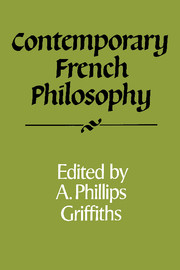Book contents
- Frontmatter
- Contents
- Preface
- Continental Insularity: Contemporary French Analytical Philosophy
- The Misprision of Pragmatics: Conceptions of Language in Contemporary French Philosophy
- Ants and Women, or Philosophy without Borders
- Motifs towards a Poetics
- The Relevance of Cartesianism
- The Enlightenment without the Critique: A Word on Michel Serres' Philosophy
- The Teleological and Deontological Structures of Action: Aristotle and/or Kant?
- The Crisis of the Post-modern Image
- Merleau-Ponty and the Phenomenology of Perception
- Epistemological History: The Legacy of Bachelard and Canguilhem
- History as Genealogy: An Exploration of Foucault's Approach to History
- Beyond Deconstruction?
- Further Adventures of the Dialectic: Merleau-Ponty, Sartre, Althusser
- Paradoxes of the Pineal: From Descartes to Georges Bataille
- Notes on Contributors
- Index
Further Adventures of the Dialectic: Merleau-Ponty, Sartre, Althusser
Published online by Cambridge University Press: 25 May 2010
- Frontmatter
- Contents
- Preface
- Continental Insularity: Contemporary French Analytical Philosophy
- The Misprision of Pragmatics: Conceptions of Language in Contemporary French Philosophy
- Ants and Women, or Philosophy without Borders
- Motifs towards a Poetics
- The Relevance of Cartesianism
- The Enlightenment without the Critique: A Word on Michel Serres' Philosophy
- The Teleological and Deontological Structures of Action: Aristotle and/or Kant?
- The Crisis of the Post-modern Image
- Merleau-Ponty and the Phenomenology of Perception
- Epistemological History: The Legacy of Bachelard and Canguilhem
- History as Genealogy: An Exploration of Foucault's Approach to History
- Beyond Deconstruction?
- Further Adventures of the Dialectic: Merleau-Ponty, Sartre, Althusser
- Paradoxes of the Pineal: From Descartes to Georges Bataille
- Notes on Contributors
- Index
Summary
notre époque exigeait de tous les hommes de lettres qu'ils fissent une dissertation de politique française …
Jean-Paul Sartre, Situations IV (Paris: Gallimard, 1964), 217This essay is not about contemporary French philosophy, strictly speaking, but something which concerns it—an important episode in its modern history. Its intention is to deal, in very schematic terms, with the nature and evolution of French Marxism from the mid-1950s to the end of the 70s, focusing on two of its best-known and most influential representatives, Jean-Paul Sartre and Louis Althusser, and relating the internal history of their ambitious reconstructions of Marxism to the wider, non-theoretical history of which they were a part—and for whose comprehension they sought to supply the conceptual instruments. Maurice Merleau-Ponty's balance-sheet of a century of Marxism, Adventures of the Dialectic, published in 1955, provides my starting point and explains my title.
By what token is Marxism relevant to this series? After all, as early as 1979 Vincent Descombes was writing of its ‘disappearance’ from the French scene. Therein precisely lies my justification. Since 1975 the whole intellectual landscape in France has undergone alteration. Under the impact of its own undoubted theoretical weaknesses, an inclement political history, strong philosophical challenges and a concerted ideological campaign, a paradigm which had enjoyed great prestige for thirty years since the Liberation, has been reduced to marginal status. The crisis of Gallic Marxism has been profound and enduring—only the latest, certainly the gravest.
- Type
- Chapter
- Information
- Contemporary French Philosophy , pp. 195 - 214Publisher: Cambridge University PressPrint publication year: 1989



